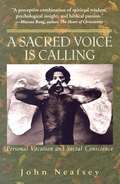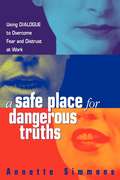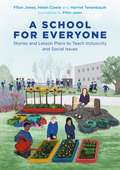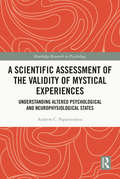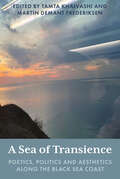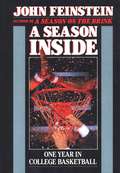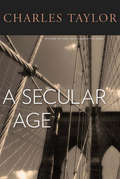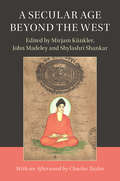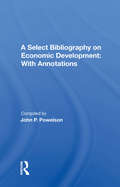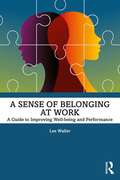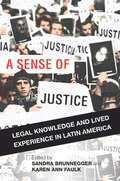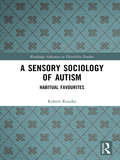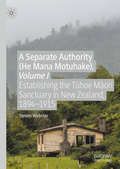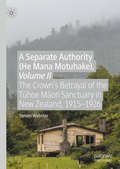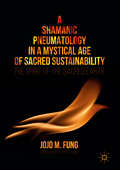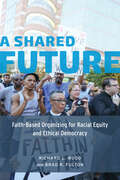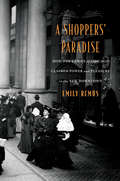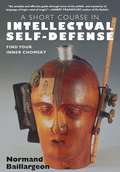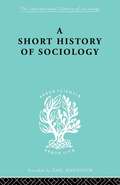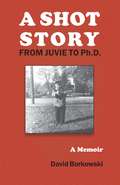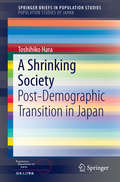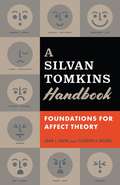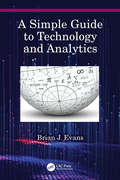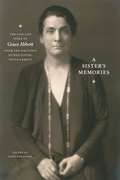- Table View
- List View
A Sacred Voice Is Calling: Personal Vocation And Social Conscience
by John NeafseyWhat does it mean to find and follow our personal calling? How do we distinguish between the "still, small voice" of our authentic vocation and all of the other competing counterfeit voices in our hearts and the needs of our world? Drawing widely on the wisdom of saints, sages, and the traditions of spiritual direction, Neafsey describes a path to living in the place, as Frederick Buechner has put it, "where our deep gladness and the world's deep hunger meet."
A Safe Place for Dangerous Truths: Using Dialogue to Overcome Fear and Distrust at Work
by Annette SimmonsNo more "checking for feet." This illuminating guide gets people to tell the truth at the meeting--not in the bathroom afterwards.Almost everybody does it--lie, that is. In one recent survey 93% of people admitted to lying regularly at work! Why? Because it's safer than telling the truth.Sadly, organizations cannot succeed in this poisonous world of half-truths, strategic omissions, and doctored information. To function optimally, businesses must create an environment where people feel free to tell the truth, no matter how disturbing. Only then can organizations unleash the responsiveness, creativity, and enthusiasm necessary to achieve their goals.This unique book shows how, using the formal process of "dialogue," such a place can be built. In a lively discussion, the author shows managers how to use this technique to encourage truth-telling by reducing fear, prompting self-examination, and opening minds * build trust where suspicion and cynicism held sway * inspire individuals to think and learn as a group * help groups talk through tough issues and move to collaborative action.
A School for Everyone: Stories and Lesson Plans to Teach Inclusivity and Social Issues
by Helen Cowie Harriet Tenenbaum Ffion JonesThis discussion tool designed to address pressing social issues for children helps teachers, parents and professionals caring for children to alleviate young people's worries and opens up conversations on tricky topics.Providing 16 stories told from different perspectives, the book covers social and emotional concerns around far-ranging issues, including refugees, disability, gender diversity and climate change. For each issue raised, the story is followed by a fact file, a set of interactive activities, lesson plans and a bank of resources to further enhance understanding and promote empathy.
A Scientific Assessment of the Validity of Mystical Experiences: Understanding Altered Psychological and Neurophysiological States (Routledge Research in Psychology)
by Andrew C. PapanicolaouIn this book the approach of the natural sciences is adopted to confront the ontological question of how far mystical experiences can be considered as reports of an objective reality rather than reports of subjective delusions. Moving beyond traditional philosophical or cultural and theological interpretations of mystical phenomena, the author uses inductive inference to analyze claims made by secular and religious mystics, highlight links between altered states of consciousness and neurochemistry, and counters reductionist claims that mystical states are exclusively products of neurochemical, neurophysiological, or psychopathological factors. The text also considers the positive long-term effects of proper use of psychedelics and meditation. This fresh approach to mystical experiences will be of interest to scholars, researchers, and postgraduate students working in the areas of psychology and neuroscience, and with an interest in mysticism in religious studies and philosophy.
A Sea of Transience: Poetics, Politics and Aesthetics along the Black Sea Coast
by Martin Demant Frederiksen Tamta KhalvashiTransience is found in every meeting and form of coexistence between people and things that live and exist by, or move across or along, the Black Sea. It may come in various forms and guises, from de facto states, tourism, migration, trafficking or military troops, and it needs to be written and captured in sensuous, affective and imaginative ways. With particular attention to poetics, politics and aesthetics, this volume focuses on the scales of transient moments and histories, and enables readers to see and sense the many forms of transience that occur in a given landscape, sea or space.
A Season Inside: One Year in College Basketball
by John FeinsteinFeinstein takes readers inside the locker rooms, the grueling practices, the late-night strategy sessions. They get a close-up look at recruiting, referees, injuries, winning, losing, and the private lives of the game's biggest stars.
A Secular Age
by Charles TaylorWhat does it mean to say that we live in a secular age? Almost everyone would agree that we--in the West, at least--largely do. And clearly the place of religion in our societies has changed profoundly in the last few centuries. In what will be a defining book for our time, Charles Taylor takes up the question of what these changes mean--of what, precisely, happens when a society in which it is virtually impossible not to believe in God becomes one in which faith, even for the staunchest believer, is only one human possibility among others. Taylor, long one of our most insightful thinkers on such questions, offers a historical perspective. He examines the development in "Western Christendom" of those aspects of modernity which we call secular. What he describes is in fact not a single, continuous transformation, but a series of new departures, in which earlier forms of religious life have been dissolved or destabilized and new ones have been created. As we see here, today's secular world is characterized not by an absence of religion--although in some societies religious belief and practice have markedly declined--but rather by the continuing multiplication of new options, religious, spiritual, and anti-religious, which individuals and groups seize on in order to make sense of their lives and give shape to their spiritual aspirations. What this means for the world--including the new forms of collective religious life it encourages, with their tendency to a mass mobilization that breeds violence--is what Charles Taylor grapples with, in a book as timely as it is timeless.
A Secular Age Beyond the West: Religion, Law and the State in Asia, the Middle East and North Africa (Cambridge Studies in Social Theory, Religion and Politics)
by John Madeley Mirjam Künkler Shylashri ShankarThis book traces religion and secularity in eleven countries not shaped by Western Christianity (Japan, China, Indonesia, India, Pakistan, Iran, Russia, Turkey, Israel, Egypt, and Morocco), and how they parallel or diverge from Charles Taylor's grand narrative of the North Atlantic world, A Secular Age (2007). In all eleven cases, the state - enhanced by post-colonial and post-imperial legacies - highly determines religious experience, by variably regulating religious belief, practice, property, education, and/or law. Taylor's core condition of secularity - namely, legal permissibility and social acceptance of open religious unbelief (Secularity III) - is largely absent in these societies. The areas affected by state regulation, however, differ greatly. In India, Israel and most Muslim countries, questions of religious law are central to state regulation. But it is religious education and organization in China and church property and public practice in Russia that bear the brunt. This book explains these differences using the concept of 'differential burdening'.
A Select Bibliography On Economic Development: With Annotations
by John P. PowelsonThis bibliography of more than 2,000 titles contains both books and journal articles, primarily those published since 1970. Most of the entries are annotated. The material is classified according to forty-eight categories, and there is also a list of relevant titles for each major country in Africa, Asia, and Latin America.
A Sense of Belonging at Work: A Guide to Improving Well-being and Performance
by Lee WallerA sense of not belonging, that we are not accepted or valued at work can be enormously detrimental to our psychological well-being and sense of self, and can impact engagement, motivation and performance. Based on extensive research, this accessible and practical book helps leaders understand the implications of belonging on our well-being and performance and equips them with the insight and tools to ensure their employees have a sense of belonging at work, through: establishing connections and developing meaningful relationships, identifying and leveraging values and strengths, developing their awareness of diversity and unconscious bias, fostering a psychologically safe environment in which all can speak up, developing an inclusive leadership mindset and challenging negative thinking patterns. The strategies and tips provided will allow readers to ensure they too have a strong sense of belonging at work. This book is designed for leaders in organisations who are responsible for the performance and well-being of their teams and for anyone who has experienced a sense of not belonging and wants to understand how to develop a sense of belonging now and in the future. It will also be of value to HR professionals and coaches, who are seeking to develop positive, inclusive workplaces.
A Sense of Justice: Legal Knowledge and Lived Experience in Latin America
by Karen Faulk Sandra BrunneggerThroughout Latin America, the idea of "justice" serves as the ultimate goal and rationale for a wide variety of actions and causes. In the Chilean Atacama Desert, residents have undertaken a prolonged struggle for their right to groundwater. Family members of bombing victims in Buenos Aires demand that the state provide justice for the attack. In Colombia, some victims of political violence have turned to the courts for resolution, while others reject the state's ability to fairly adjudicate their grievances and have constructed a non-state tribunal. In each of these examples, the protagonists seek one main thing: justice. A Sense of Justice ethnographically explores the complex dynamics of justice production across Latin America. The chapters examine (in)justice as it is lived and imagined today and what it means for those who claim and regulate its parameters, including the Brazilian police force, the Permanent Peoples' Tribunal in Colombia, and the Argentine Supreme Court. Inextricable as "justice" is from inequality, violence, crime, and corruption, it emerges through memory, in space, and where ideals meet practical limitations. Ultimately, the authors show how understanding the dynamic processes of constructing justice is essential to creating cooperative rather than oppressive forms of law.
A Sensory Sociology of Autism: Habitual Favourites (Routledge Advances in Disability Studies)
by Robert RourkeThis innovative book places the sensory experiences of autistic individuals within a sociological framework. It instigates new discussions around sensory experience, autism and how disability and ability can be reconceived. Autism is commonly understood to involve social and communication difficulties. Less commented upon is the sensory challenges faced by those with autism. Sociology is no different, focusing on communication and neglecting the sensory dimensions of experience. Sensory experiences and relations are central to how we understand and navigate through the natural and social worlds, and mediate our interactions with other people, objects and spaces. In this book, the author explores how these processes are affected by the favourite activities of autistic people. With real-life case studies and cutting-edge research, this book will be useful to students, autistic people, advocates and carers, disability studies researchers and sociologies of disability and the senses.
A Separate Authority (He Mana Motuhake), Volume I: Establishing the Tūhoe Māori Sanctuary in New Zealand, 1894–1915
by Steven WebsterThis book is an ethnohistorical reconstruction of the establishment in New Zealand of a rare case of Maori home-rule over their traditional domain, backed by a special statute and investigated by a Crown commission the majority of whom were Tūhoe leaders. However, by 1913 Tūhoe home-rule over this vast domain was being subverted by the Crown, which by 1926 had obtained three-quarters of their reserve. By the 1950s this vast area had become the rugged Urewera National Park, isolating over 200 small blocks retained by stubborn Tūhoe "non-sellers". After a century of resistance, in 2014 the Tūhoe finally regained statutory control over their ancestral domain and a detailed apology from the Crown.
A Separate Authority (He Mana Motuhake), Volume II: The Crown’s Betrayal of the Tūhoe Māori Sanctuary in New Zealand, 1915–1926
by Steven WebsterFollowing on from Volume I on the formation of the Urewera District Native Reserve, this monograph examines the period from 1908 to 1926, during which time the Crown subverted Tūhoe control of the UDNR, established a mere decade earlier. While Volume I described how the Tūhoe were able to deploy kin-based power to manipulate Crown power as well as confront one another, this volume describes ways in which the same ancestral descent groups closed ranks to survive nearly two decades of predatory Crown policies determined to dismantle their sanctuary. A relentless Crown campaign to purchase individual Tūhoe land shares ultimately resulted in a misleading Crown scheme to consolidate and relocate Tūhoe land shares, thereby freeing up land for the settlement of non- Tūhoe farmers. By the 1950s, over 200 small Tūhoe blocks were scattered throughout one of the largest National Parks in New Zealand. Although greatly weakened by these policies in terms of kinship solidarity as well as land and other resources, Tūhoe resistance continued until the return of the entire park in 2014—with unreserved apologies and promises of future support. In both volumes of A Separate Authority (He Mana Motuhake), Webster takes the stance of an ethnohistorian: he not only examines the various ways control over the Urewera District Native Reserve (UDNR) was negotiated, subverted or betrayed, and renegotiated during this time period, but also focuses on the role of Māori hapū, ancestral descent groups and their leaders, including the political economic influence of extensive marriage alliances between them. The ethnohistorical approach developed here may be useful to other studies of governance, indigenous resistance, and reform, whether in New Zealand or elsewhere.
A Serious Sequence of Hidden Historical Accounts
by Stanley W. JohnsonThe record of black participation in the American military is primarily one of distinction. Black people have served in every significant military conflict from the Colonial period through the most recent United States engagements.
A Shamanic Pneumatology in a Mystical Age of Sacred Sustainability: The Spirit of the Sacred Earth
by Jojo M. FungThis book represents a germinal effort that urges all religious and world leaders to savor the mystical spirituality, especially the cosmology and spirituality of sacred sustainability of the indigenous peoples. The power of indigenous spirit world is harnessed for the common good of the indigenous communities and the regenerative power of mother earth. This everyday mysticism of the world as spirited and sacred serves to re-enchant a world disillusioned by the unsustainability of destructive economic systems that have spawned the current ecological crises. Author Jojo Fung offers insight from his lived-experience and this book represents his effort to correlate the indigenous spirit world with Catholic Pneumatology and articulate the activity of God’s Spirit as the Spirit of Sacred Sustainability.
A Shared Future: Faith-Based Organizing for Racial Equity and Ethical Democracy
by Richard L. Wood Brad R. FultonFaith-based community organizers have spent decades working for greater equality in American society, and more recently have become significant players in shaping health care, finance, and immigration reform at the highest levels of government. In A Shared Future, Richard L. Wood and Brad R. Fulton draw on a new national study of community organizing coalitions and in-depth interviews of key leaders in this field to show how faith-based organizing is creatively navigating the competing aspirations of America's universalist and multiculturalist democratic ideals, even as it confronts three demons bedeviling American politics: economic inequality, federal policy paralysis, and racial inequity. With a broad view of the entire field and a distinct empirical focus on the PICO National Network, Wood and Fulton's analysis illuminates the tensions, struggles, and deep rewards that come with pursuing racial equity within a social change organization and in society. Ultimately, A Shared Future offers a vision for how we might build a future that embodies the ethical democracy of the best American dreams.
A Shoppers’ Paradise: How the Ladies of Chicago Claimed Power and Pleasure in the New Downtown
by Emily RemusPopular culture assumes that women are born to shop and that cities invite their trade. But downtowns were not always welcoming to women. Emily Remus turns to Chicago at the turn of the last century to chronicle an unheralded revolution in women’s rights that took place not at the ballot box but in the streets and stores of the business district.
A Short Course in Intellectual Self Defense: Find Your Inner Chomsky
by Andrea Schmidt Normand Baillargeon CharbWhat is the relationship between democracy and critical thinking? What must a citizen in a democracy know to make the word democracy meaningful? In A Short Course in Intellectual Self-Defense, historian and educator Normand Baillargeon provides readers with the tools to see through the spin and jargon of everyday politics and news reporting in order to decide for themselves what is at stake and how to ask the necessary questions to protect themselves from the manipulations of the government and the media. Whether the issue be the call to what we're told will be a bloodless war, the "debate" around Intelligent Design, or the meaning of a military expenditure, Baillargeon teaches readers to evaluate information and sort fact from official and media spin.
A Short History of Sociology (International Library of Sociology)
by Heinz MausOriginally published in English in 1962, this book presents in clear language an account of the growth of sociology from its earliest roots in the Enlightenment, through the 19th century philosophers in Germany, positivists in France, social workers in England, the theorists in America, through the pioneering days of the early and middle part of the 20th century.
A Shot Story: From Juvie to Ph.D.
by David BorkowskiThe botched robbery didn’t do it. Neither did the three gunshots. It wasn’t until he was administered last rites that David Borkowski realized he was about to die, at age fifteen. A Shot Story: From Juvie to Ph.D. is a riveting account of how being shot saved his life and helped a juvenile delinquent become an esteemed English professor.Growing up in a working-class section of Staten Island, David and his friends thought they had all the answers: They knew where to hang out without being hassled, where to get high, and what to do if the cops showed up. But when David and his friend called in a pizza order so they could rob the delivery man, things didn’t turn out as they’d planned. Staring down the barrel of a gun, David and his friend panicked and took off as the cop fired. Convinced the cop was shooting harmless “salt” bullets, David darted through lawns as the cop gave chase. Much later, when David was bleeding to death, did the cops realize they had hit one of their own—the son of a fellow cop.Borderline illiterate at the time of the shooting, David took his future into his own hands and found salvation in books. But his attempts to improve his life were stymied by lack of familial support. Bound on all sides by adults who had no faith in his ability to learn or to succeed, David persevered and earned his Ph.D..Funny and poignant, but always honest and reflective, A Shot Story tracks David Borkowski’s life before and after the “accident” and tells how his having been a rather unremarkable student may have been a blessing in disguise. A wonderful addition to the working-class narrative genre, A Shot Story presents a gripping account of the silences of working-class culture as well as the male subculture of Staten Island. Through his heartfelt memoir, Borkowski explores the universal lesson of turning a wrong into a rite of passage.
A Shrinking Society: Post-Demographic Transition in Japan (SpringerBriefs in Population Studies)
by Toshihiko HaraThis is the book to focus on a new phenomenon emerging in the twenty-first century: the rapidly aging and decreasing population of a well-developed country, namely, Japan. The meaning of this phenomenon has been successfully clarified as the possible historical consequence of the demographic transition from high birth and death rates to low ones. Japan has entered the post-demographic transitional phase and will be the fastest-shrinking society in the world, leading other Asian countries that are experiencing the same drastic changes. The author used the historical statistics, compiled by the Statistic Bureau, Ministry of Internal Affairs and Communications in 2006 and population projections for released in 2012 by the National Institute of Population and Social Security Research, to show the past and future development of the dependency ratio from 1891 to 2060. Then, utilizing the population life table and net reproduction rate, the effects of increasing life expectancy and declining fertility on the dependency ratio were observed separately. Finally, the historical relationships among women's survival rates at reproductive age, the theoretical fertility rate to maintain the replacement level and the recorded total fertility rate (TFR) were analyzed. Historical observation showed TFR adapting to the theoretical level of fertility with a certain time lag and corresponding to women's survival rates at reproductive age. Women's increasing lifespan and survival rates could have influenced decision making to minimize the risk of childbearing. Even if the theoretical fertility rate meets the replacement level, women's views of minimizing the risk may remain unchanged because for women the cost-benefit imbalance in childbearing is still too high in Japan. Based on the findings, the author discusses the sustainability of Japanese society in relation to national finances, social security reform, family policies, immigration policies and community polices.
A Silvan Tomkins Handbook: Foundations for Affect Theory
by Elizabeth A. Wilson Adam J. FrankAn accessible guide to the work of American psychologist and affect theorist Silvan Tomkins The brilliant and complex theories of psychologist Silvan Tomkins (1911–1991) have inspired the turn to affect in the humanities, social sciences, and elsewhere. Nevertheless, these theories are not well understood. A Silvan Tomkins Handbook makes his theories portable across a range of interdisciplinary contexts and accessible to a wide variety of contemporary scholars and students of affect. A Silvan Tomkins Handbook provides readers with a clear outline of Tomkins&’s affect theory as he developed it in his four-volume masterwork Affect Imagery Consciousness. It shows how his key terms and conceptual innovations can be used to build robust frameworks for theorizing affect and emotion. In addition to clarifying his affect theory, the Handbook emphasizes Tomkins&’s other significant contributions, from his broad theories of imagery and consciousness to more focused concepts of scenes and scripts. With their extensive experience engaging and teaching Tomkins&’s work, Adam J. Frank and Elizabeth A. Wilson provide a user-friendly guide for readers who want to know more about the foundations of affect studies.
A Simple Guide to Technology and Analytics
by Brian J. EvansEveryday technology is constantly changing, and it’s hard to keep up with it at times. What is all this talk about automation, STEM, analytics and super-computers, and how will it really affect my daily life at work and in the home? This book is a simple guide to everyday technology and analytics written in plain language. It starts with explaining how computer networks are increasing in speed so fast that we can do more in less time than ever before. It explains the analytical jargon in plain English and why robotics in the home will be aided by the new technology of the quantum computer. Richly furnished with over 200 illustrations, photos and with minimal equations, A Simple Guide to Technology and Analytics is a ready reference book for those times when you don’t really understand the technology and analytics being talked about. It explains complicated topics such as automated character recognition in a very simple way, and has simple exercises for the reader to fully understand the technology (with answers at the back). It even has explanations on how home appliances work, which are very useful the next time you go shopping for a microwave or TV. Even the Glossary at the back can be used as a quick look-up explanation for those on the go.
A Sister's Memories: The Life and Work of Grace Abbott from the Writings of Her Sister, Edith Abbott
by John SorensenAmong the great figures of Progressive Era reform, Edith and Grace Abbott are perhaps the least sung. Peers, companions, and coworkers of legendary figures such as Jane Addams and Sophonisba Breckinridge, the Abbott sisters were nearly omnipresent in turn-of-the-century struggles to improve the lives of the poor and the working-class people who fed the industrial engines and crowded into diverse city neighborhoods. Grace's innovative role as a leading champion for the rights of children, immigrants, and women earned her a key place in the history of the social justice movement. As her friend and colleague Eleanor Roosevelt wrote, Grace was "one of the great women of our day . . . a definite strength which we could count on for use in battle. " A Sister's Memories is the inspiring story of Grace Abbott (1878-1939), as told by her sister and social justice comrade, Edith Abbott (1876-1957). Edith recalls in vivid detail the Nebraska childhood, impressive achievements, and struggles of her sister who, as head of the Immigrants' Protective League and the U. S. Children's Bureau, championed children's rights from the slums of Chicago to the villages of Appalachia. Grace's crusade can perhaps be best summed up in her well-known credo: "Justice for all children is the high ideal in a democracy. " Her efforts saved the lives of thousands of children and immigrants and improved those of millions more. These trailblazing social service works led the way to the creation of the Social Security Act and UNICEF and caused the press to nickname her "The Mother of America's 43 Million Children. " She was the first woman in American history to be nominated to the presidential cabinet and the first person to represent the United States at a committee of the League of Nations. Edited by Abbott scholar John Sorensen, A Sister's Memories is destined to become a classic. It shapes the diverse writings of Edith Abbott into a cohesive narrative for the first time and fills in the gaps of our understanding of Progressive Era reforms. Readers of all backgrounds will find themselves engrossed by this history of the unstoppable, pioneer feminist Abbott sisters.
